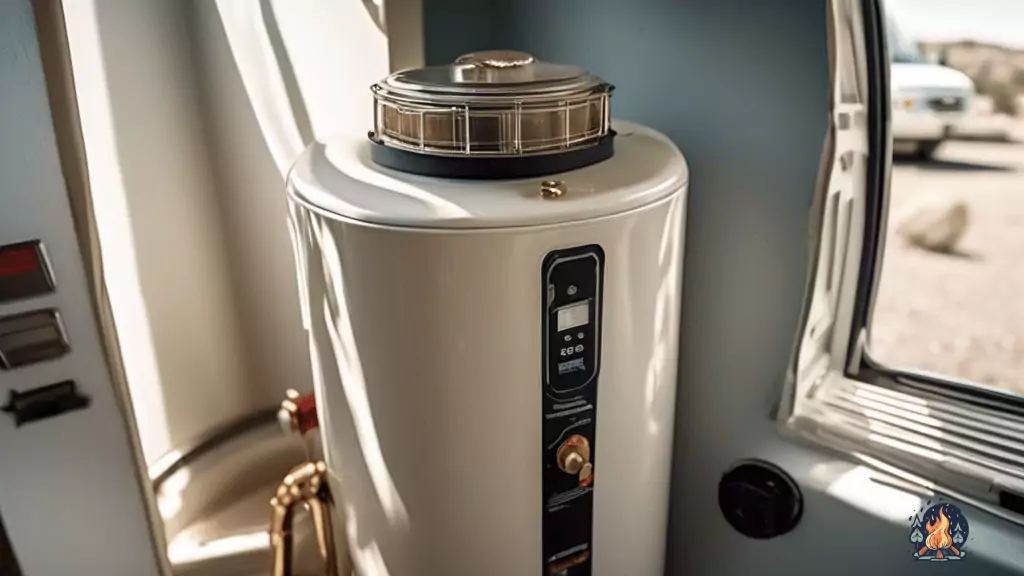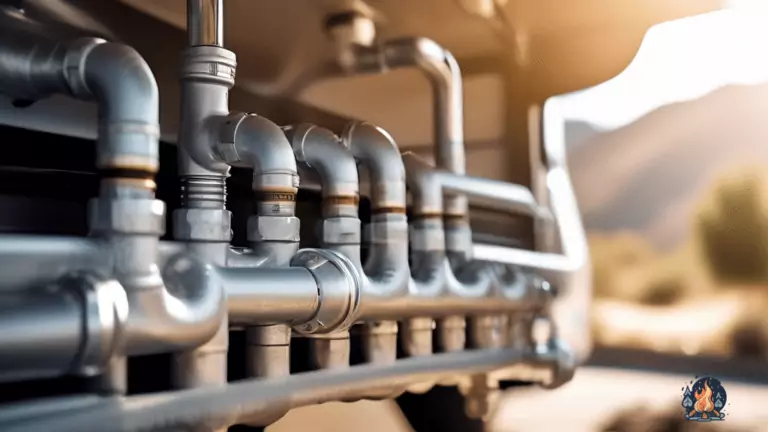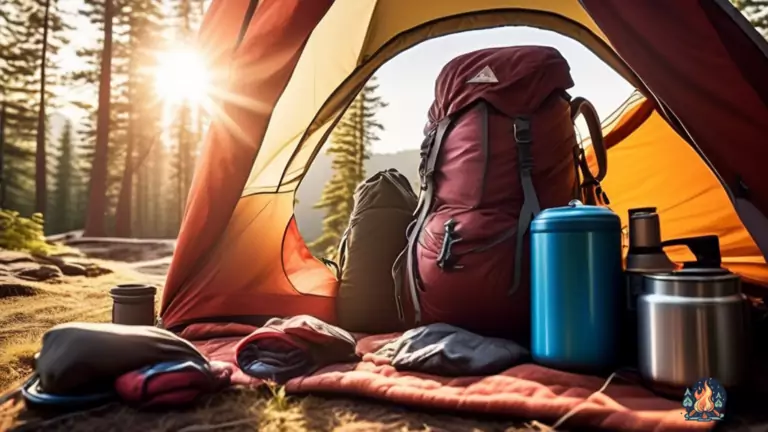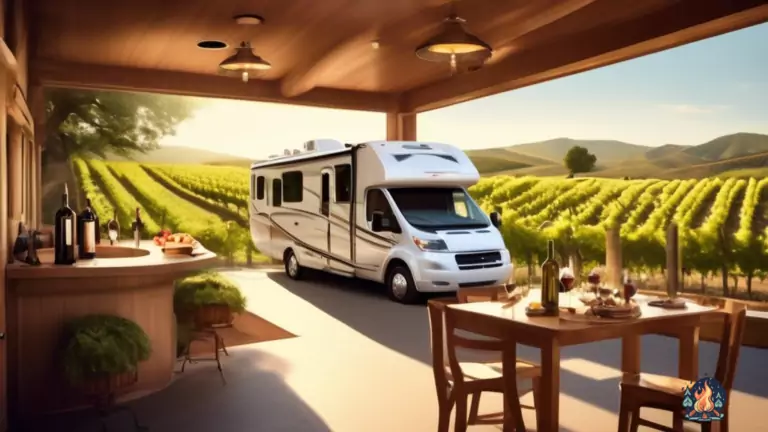Common RV Water Heater Issues And Troubleshooting Tips
by Kevin Fairbanks • Updated: January 21, 2024
Don’t let RV water heater issues ruin your camping trip. Learn how to troubleshoot and fix common problems with expert tips. Click here for valuable troubleshooting advice now!

Are you tired of freezing showers and water pressure that rivals a trickle?
Well, fear not, fellow RV enthusiasts, because in this article, we’re diving headfirst into the world of common RV water heater issues and how to troubleshoot them like a pro.
So grab your toolbox and prepare for some serious DIY action, because we’re about to tackle some hot water problems with a dash of humor and a whole lot of know-how.
Picture this: you’re on a beautiful camping trip, surrounded by nature’s majesty, and all you want is a nice, hot shower to wash away the day’s adventures.
But alas, your RV water heater has other plans.
No hot water, no problem! We’ll explore the possible causes, from faulty thermostats to gas supply issues, and guide you through the solutions like a trusty GPS guiding you to the nearest hot spring.
So get ready to wave goodbye to cold showers and say hello to the luxurious warmth of a properly functioning water heater.
Let’s get troubleshooting, shall we?
Key Takeaways
- Regular tank flush every few months is important to prevent bacteria growth in the RV water heater.
- Using an RV water filter can help remove impurities and prevent odors in the water.
- Avoiding the use of harsh chemicals or cleaners is essential to prevent damage to the RV water heater tank.
- If there is a persistent odor in the RV water heater, it is recommended to consult a professional for further inspection and troubleshooting.
No Hot Water: Possible Causes and Solutions
If you’re experiencing no hot water in your RV water heater, don’t panic! Did you know that 45% of RV owners have encountered this issue at some point? But don’t worry, there are several possible causes and solutions that can help you get your hot water flowing again.
One of the most common causes of no hot water in your RV water heater is a faulty pilot light. It’s like the little flame that keeps the hot water train chugging along, and if it’s not working, you’re left with a cold shower. So, what can you do about it?
Well, first, locate the pilot light and make sure it’s lit. If it’s not, try relighting it according to the manufacturer’s instructions. If that doesn’t work, it could be a gas supply issue. Check to see if the gas valve is turned on and if the gas supply is sufficient. And if all else fails, it might be time to call in the professionals for a little extra help.
Another possible cause of no hot water is a malfunctioning thermostat. This sneaky little culprit could be messing with your water temperature without you even knowing it. To check if this is the problem, turn up the thermostat temperature setting and see if that gets the hot water flowing. If not, it might be time to replace the thermostat altogether. And hey, while you’re at it, why not give it a funny name like "Thermy the Terrible Thermostat" to lighten the mood? Remember, laughter is the best medicine, even when it comes to RV water heater issues.
So, the next time you find yourself without hot water in your RV water heater, don’t despair. Just remember these possible causes and solutions, and you’ll be back to enjoying those steamy showers in no time.
Low Water Pressure: How to Identify and Fix the Issue
To identify and fix low water pressure in your RV, start by checking for clogged or blocked faucets and pipes. Sometimes, debris or mineral deposits can accumulate in the faucets or pipes, causing a decrease in water flow. To check for clogged faucets, simply remove the aerator and clean out any debris that may be blocking the water flow. If the faucets are clear, move on to inspecting the pipes. Look for any signs of blockage, such as kinks or bends in the pipes. If you find any, gently straighten them out to restore proper water flow.
Another common cause of low water pressure in RVs is a faulty water pump. The water pump is responsible for pumping water from the fresh water tank to the faucets and shower in your RV. If the water pump is not functioning properly, it can result in low water pressure. To check the water pump, start by turning off all faucets and appliances that use water. Then, turn on the water pump and listen for any unusual sounds, such as grinding or squeaking. If you hear any strange noises, it may indicate a problem with the water pump and it may need to be replaced.
Now, let’s take a look at the 3 column and 5 row table to help you visualize the possible causes and solutions for low water pressure in your RV:
| Possible Cause | Symptoms | Solution |
|---|---|---|
| Clogged Faucets | Decreased water flow from specific faucets | Remove aerator and clean out debris |
| Blocked Pipes | Decreased water flow throughout the RV | Inspect pipes for blockages and straighten if necessary |
| Faulty Water Pump | Low water pressure in all faucets and appliances | Check for unusual sounds and consider replacing the water pump |
Remember, maintaining proper water pressure in your RV is essential for a comfortable and enjoyable camping experience. So, don’t let low water pressure dampen your spirits. With these troubleshooting tips, you’ll be able to identify and fix the issue in no time. Happy camping!
Leaks and Water Damage: Signs to Watch Out For and Repair Steps
One telltale sign of a "drippy situation" is the presence of dampness or pooling water in unexpected areas of your recreational vehicle. You might find yourself doing a double-take when you see water seeping out from under your RV’s bathroom sink or discover a small lake forming in your bedroom closet.
Don’t panic, though! It’s just your water heater showing off its leaky skills. Seriously, though, leaks can be a common issue with RV water heaters, and they can cause some serious water damage if not addressed promptly.
Now, if you enjoy the idea of turning your RV into a water park, then by all means, ignore those leaks and let the good times flow! But if you’d rather keep your RV dry and avoid costly repairs, here are a few steps you can take to fix those pesky leaks.
First, locate the source of the leak. It could be a faulty pressure relief valve, a cracked drain valve, or loose connections. Tighten any loose connections and replace any damaged valves. If the leak persists, it might be a sign of a more serious issue, such as a corroded or damaged tank. In that case, it’s best to call in the professionals to assess and repair the problem.
Remember, your RV is not a submarine, so keep it dry and leak-free for a much smoother and less soggy journey!
Pilot Light Problems: Troubleshooting Tips for Ignition Issues
Having trouble with the pilot light? Here are some troubleshooting tips for ignition issues.
First, check if the pilot light is lit. If not, try relighting it by following the manufacturer’s instructions.
If the pilot light still won’t stay lit, it could be due to a dirty or clogged pilot assembly. In that case, gently clean the assembly using a small brush or compressed air.
Another common issue is a faulty thermocouple, which is the safety device that detects if the pilot light is on. If the thermocouple is faulty, it may need to be replaced.
And finally, if all else fails, it’s possible that there is a gas supply issue. Make sure the gas valve is open and that there is enough propane in the tank.
Check if the pilot light is lit.
Clean the pilot assembly if it’s dirty or clogged.
Replace the thermocouple if it’s faulty.
Ensure there is enough gas supply.
Dealing with a pilot light problem can be frustrating, but with these troubleshooting tips, you’ll be back to enjoying hot water in no time. Remember to always follow safety precautions and consult a professional if you’re unsure about any repairs.
Good luck, and may the flames of your pilot light burn bright!
Strange Noises and Odors: Common Water Heater Symptoms and Remedies
Nothing ruins a relaxing shower quite like strange noises and unpleasant odors emanating from your water heater. But fear not, fellow RV enthusiast! We’ve got some common symptoms and remedies to help you troubleshoot and fix these issues, so you can get back to enjoying your hot showers in peace.
Let’s start with the strange noises. If you’re hearing a loud banging or popping sound coming from your water heater, it’s likely due to sediment buildup in the tank. Over time, minerals and debris can settle at the bottom of the tank, causing these noises when the water heats up. To fix this, you’ll need to drain and flush the tank to remove the sediment. Don’t worry, it’s not as complicated as it sounds! Just follow these steps:
| Steps | Remedies |
|---|---|
| 1. Turn off the water heater and let it cool down. | – Perform a regular tank flush every few months to prevent sediment buildup. |
| 2. Attach a hose to the drain valve at the bottom of the tank. | – Install a water softener to reduce mineral buildup in the tank. |
| 3. Open a hot water faucet in your RV to allow air into the system. | – Consider replacing an old water heater with a newer, more efficient model. |
| 4. Open the drain valve and let the water flow out. | – If the noises persist, it’s best to consult a professional for further inspection. |
| 5. Once the tank is empty, close the drain valve and remove the hose. |
Now, let’s move on to those unpleasant odors. If your water heater is emitting a foul smell, it could be due to bacteria growth in the tank. This is a common issue in RV water heaters that are not used frequently. To combat this, you’ll need to sanitize the tank. Here’s how:
| Steps | Remedies |
|---|---|
| 1. Turn off the water heater and let it cool down. | – Perform a regular tank flush every few months to prevent bacteria growth. |
| 2. Mix a solution of one cup of bleach for every gallon of water your tank holds. | – Use an RV water filter to remove impurities and prevent odors. |
| 3. Attach a hose to the tank’s drain valve and open it. | – Avoid using harsh chemicals or cleaners that can damage the tank. |
| 4. Pour the bleach solution into the tank and let it sit for a few hours. | – If the odor persists, it’s best to consult a professional for further inspection. |
| 5. Close the drain valve and fill the tank with fresh water. |
By following these troubleshooting tips, you’ll be able to tackle strange noises and odors coming from your RV water heater like a pro. And remember, don’t be afraid to seek professional help if the issues persist or if you’re unsure about performing any of the steps. Happy showering!
Frequently Asked Questions
How do I winterize my RV water heater to prevent freezing during colder months?
To prevent your RV water heater from freezing during colder months, you’ll want to winterize it. Drain the tank and remove any water. Then, use an RV antifreeze to flush the system. Voila! No frozen water heater surprises.
Can I use my RV water heater while driving?
Sure, you can use your RV water heater while driving, but be prepared for a wild hot water adventure! Just make sure you secure it properly and keep an eye on the temperature. Buckle up, it’s gonna be a steamy ride!
What should I do if I notice a rotten egg smell coming from my RV water heater?
If you catch a whiff of a rotten egg coming from your RV water heater, don’t panic! It’s a symbol of a gas leak. Turn off the gas supply, open windows for fresh air, and call a professional ASAP. Safety first, funny smells second!
How often should I flush and clean my RV water heater?
You should flush and clean your RV water heater at least once a year to prevent sediment buildup and maintain optimal performance. It’s like giving your water heater a spa day, and who doesn’t love a happy, relaxed appliance?
Are there any safety precautions I should take when troubleshooting and repairing my RV water heater?
Before tackling your RV water heater issues, remember this: 57% of RV owners have experienced a water heater malfunction. To ensure safety, switch off the power, relieve pressure, and wear protective gear while troubleshooting and repairing. Safety first, folks!

Hi, I’m Kevin, a lifelong camping enthusiast and the voice behind Campfire Discoveries. From tent to RV to cabin camping, I’ve explored it all. Join me as we share stories and tips around the campfire, deepening our connection with the great outdoors.
Keep Reading
-
Common Issues With RV Plumbing And How To Troubleshoot
Learn how to troubleshoot common RV plumbing issues like a pro and keep your adventures on the road flowing smoothly. Don’t let plumbing problems dampen your journey – click here to become an expert in RV plumbing troubleshooting today!
-
The Essential Camping Packing List: Never Forget Anything
Camp like a pro with our ultimate camping packing list! Never forget anything on your next adventure. Don’t miss out – start packing now and make every trip unforgettable!
-
Wine Lover’s Paradise: RV Camping Near Wineries
Looking for the perfect getaway? Experience RV camping near wineries and indulge in tastings, breathtaking views, and unforgettable adventures. Plan your wine lover’s paradise today!



